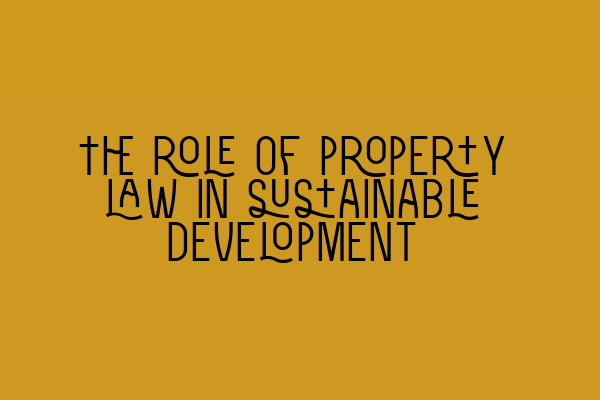The Role of Property Law in Sustainable Development
Introduction
Sustainable development is a growing concern globally, as we strive to find a balance between economic growth and environmental conservation. Property law plays a significant role in this endeavor, as it encompasses regulations and principles that help shape and guide sustainable development practices. In this blog post, we will explore the various aspects of property law that contribute to sustainable development and highlight its importance in creating a more environmentally conscious society.
1. Zoning and Land Use Regulations
One of the key ways property law promotes sustainable development is through zoning and land use regulations. These regulations define how land can be utilized, ensuring that development occurs in a manner that considers environmental sustainability. By designating certain areas as residential, commercial, or industrial zones, property law aims to minimize the negative impact of development on natural resources and ecosystems.
2. Conservation Easements
Conservation easements are legal agreements that restrict the use or development of a property to protect its natural resources and environmental value. They are a powerful tool in property law that allows individuals or organizations to voluntarily limit property rights for the greater good of environmental preservation. Conservation easements can be used to maintain open spaces, protect wildlife habitats, and safeguard biodiversity. They promote sustainable development by ensuring that development activities do not infringe upon sensitive areas.
3. Environmental Impact Assessments
In many jurisdictions, property law requires developers to conduct environmental impact assessments before undertaking certain projects. These assessments evaluate the potential environmental consequences of a proposed development and assess whether it complies with sustainable development principles. They help identify potential risks, mitigate adverse effects, and encourage developers to adopt more environmentally friendly practices.
4. Energy Efficiency Regulations
Energy efficiency is a critical component of sustainable development, and property law plays a crucial role in promoting energy-efficient practices. Many countries have implemented regulations that require buildings to meet certain energy performance standards. These standards may include requirements for insulation, lighting, heating, ventilation, and air conditioning systems. By incorporating energy efficiency regulations into property law, governments are driving sustainable development by reducing carbon emissions and promoting renewable energy sources.
5. Green Building Certifications
Green building certifications, such as LEED (Leadership in Energy and Environmental Design) or BREEAM (Building Research Establishment Environmental Assessment Method), are voluntary programs that promote sustainable building practices. Property law can incentivize developers to obtain these certifications by providing tax breaks or other benefits. By fostering the construction of environmentally friendly buildings, property law encourages sustainable development and contributes to a greener future.
Conclusion
Property law plays a multifaceted role in facilitating sustainable development. Through zoning and land use regulations, conservation easements, environmental impact assessments, energy efficiency regulations, and green building certifications, property law helps shape development in a way that considers environmental sustainability. These legal frameworks create a balance between economic progress and ecological preservation, paving the way for a more sustainable and environmentally conscious future.
Related Articles:
– SQE 1 Practice Exam Questions
– SQE 1 Practice Mocks FLK1 FLK2
– SQE 2 Preparation Courses
– SQE 1 Preparation Courses
– SRA SQE Exam Dates
